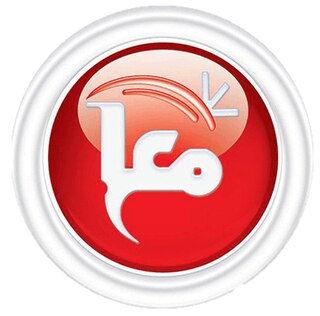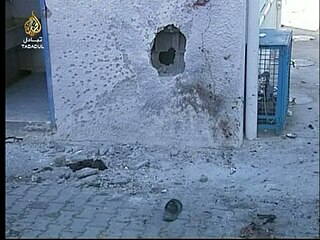
The Gaza Strip, also known simply as Gaza, is a small territory located on the eastern coast of the Mediterranean Sea; it is the smaller of the two Palestinian territories, the other being the West Bank, that make up the State of Palestine. Inhabited by mostly Palestinian refugees and their descendants, Gaza is one of the most densely populated territories in the world. Gaza is bordered by Egypt on the southwest and Israel on the east and north. The territory has been under Israeli occupation since 1967.

Media coverage of the Israeli–Palestinian conflict has been said, by both sides and independent observers, to be biased. This coverage includes news, academic discussion, film, and social media. These perceptions of bias, possibly exacerbated by the hostile media effect, have generated more complaints of partisan reporting than any other news topic and have led to a proliferation of media watchdog groups.

The Karni Crossing was a cargo terminal on the Israel-Gaza Strip barrier located in the north-eastern end of the Gaza Strip that existed between 1994 and 2011 and used for the export and import of goods from/to the Gaza Strip. This was done as a 'back-to-back' transfer, meaning that Palestinian products meant for export were removed from a Palestinian truck and placed in an Israeli truck, and vice versa for incoming goods. The Karni Crossing was also used by the residents of Netzarim since the Karni road was the only route to that isolated Israeli settlement on which Jewish travel was allowed after the 1994 implementation of the Oslo Accords. The crossing has been affected by the Israeli Blockade of the Gaza Strip.
Sylvia Poggioli is a retired American radio reporter best known for her work with National Public Radio. She was the network's longtime senior European correspondent.

Jennifer Griffin is an American journalist who works as Chief national security correspondent at the Pentagon for Fox News. She joined Fox News in October 1999 as a Jerusalem-based correspondent. Prior to the posting, she reported for three years from Moscow for Fox News.
Sara M. Roy is an American political economist and scholar. She is a Research Associate at the Center for Middle Eastern Studies at Harvard University.
Donna Robinson Divine is the Morningstar Family Professor in Jewish Studies and Professor of Government at Smith College. She holds a B.A. from Brandeis University, 1963, and a Ph.D. from Columbia University, 1971, in Political Science. Divine has worked in the fields of Comparative Politics, Middle Eastern Politics, and Political Theory.
Yezid Sayigh is a Palestinian academic. He is a senior fellow at the Carnegie Middle East Center in Beirut, Lebanon. Previously, he was a professor of Middle East Studies at the Department of War Studies at King's College London, a member of the Academic Board of the Gulf Research Center, and a member of the board of trustees of the Palestinian Center for Policy and Survey Research (PCPSR). From 1994 to 2003, he was the assistant director of studies at the Centre of International Studies at Cambridge University. Sayigh also headed the Middle East Research Programme of the International Institute for Strategic Studies (IISS) in London from 1998 to 2003. Sayigh was a negotiator of the 1994 Gaza–Jericho Agreement between the Palestine Liberation Organisation and Israel. He headed the Palestinian delegation to the Multilateral Working Group on Arms Control and Regional Security (1992-1994), and was a MacArthur Scholar and Research Fellow at St Antony's College, Oxford (1990-1994). From 2005 to 2006, Sayigh was a visiting professor at the faculty of Political Studies and Public Administration at the American University of Beirut.

Ma'an News Agency is a large wire service created in 2005 in the Palestinian territories. It is part of the Ma'an Network, a non-governmental organization media network created in 2002 in the Palestinian territories among independent journalists throughout the West Bank and Gaza Strip. It has partnerships with eight local television stations and twelve local radio stations. Ma'an News Agency publishes news 24 hours a day in Arabic, Hebrew and English, and claims to be one of the largest wire services in the Palestinian territories, with over three million visits per month. Ma'an News Agency also publishes feature stories, analysis and opinion articles. The agency's headquarters are based in Bethlehem and it has an office in Gaza.

The Gaza War, also known as the First Gaza War, Operation Cast Lead, or the Gaza Massacre, and referred to as the Battle of al-Furqan by Hamas, was a three-week armed conflict between Gaza Strip Palestinian paramilitary groups and the Israel Defense Forces (IDF) that began on 27 December 2008 and ended on 18 January 2009 with a unilateral ceasefire. The conflict resulted in 1,166–1,417 Palestinian and 13 Israeli deaths. Over 46,000 homes were destroyed in Gaza, making more than 100,000 people homeless.

The al-Fakhura school shelling was an Israeli military strike that took place during the Gaza War on 6 January 2009 near a United Nations-run school in the Jabalia Camp in the Gaza Strip. According to the UN and several non-governmental organizations (NGOs), more than 40 people were killed. Israel reported the death toll as nine Hamas militants and three noncombatants with senior IDF officers stating that the death toll published by Hamas was "grossly exaggerated". Israel stated it fired on the school in response to militant gunfire believed to be coming from al-Fakhura. A UN inquiry said that there was no firing from within the school and there were no explosives within the school, but could not establish if militants fired from the vicinity of the school.
Incidents in the Gaza War include incidents involving attacks against civilians, a school, a mosque, and naval confrontations.
Media played an important part of the 2008–2009 Israel–Gaza conflict. Foreign press access to Gaza has been limited since November 2008 via either Egypt or Israel. On 29 December 2008, the Israeli Supreme Court ordered that journalists be allowed into Gaza whenever the crossings were opened, but the IDF refused to comply. There have been arrests of journalists due to violations of wartime censorship in Israel, and these have been denounced by international press organizations. Media infrastructure, including Al-Aqsa TV transmission equipment and foreign and local press offices, were hit during the conflict. Media relations also played an important role, with the use of new media on the part of Israel, as well as a clear public relations campaign.

Smadar Lavie is a professor emerita of anthropology at the University of California Davis, and a Mizrahi anthropologist, author, and activist. She specializes in the anthropology of Egypt, Israel and Palestine, emphasizing issues of race, gender and religion. She received her doctorate in anthropology from the University of California at Berkeley (1989).
Events in the year 2009 in the Palestinian territories.
Events in the year 2008 in the Palestinian territories.

The two-state solution is a proposed approach to resolving the Israeli–Palestinian conflict, by creating two states on the territory of the former Mandatory Palestine. It is often contrasted with the one-state solution, which is the establishment a single state in former Mandatory Palestine with equal rights for all its inhabitants. The two-state solution is supported by many countries, and the Palestinian Authority. Israel currently does not support the idea, though it has in the past.

Media coverage of the 2014 Gaza War were varied depending on the media source. In the English-speaking world, U.S. news sources were often more sympathetic to Israel, while British news sources were more critical of Israel. Commentators on both sides have claimed that the media is biased either for or against Israel. According to The Times of Israel, British sources were more often critical of Israel. As the conflict progressed and Palestinian deaths increased, media became somewhat more critical of Israel.

Zaha Hassan is a Palestinian human rights lawyer, political analyst, activist, researcher and writer. She advocates for human rights in the State of Palestine and also advocates for peace between Israel and State of Palestine. She is a visiting fellow at the Carnegie Endowment for International Peace, New America Foundation and Middle East Program. She currently lives in Washington D.C., United States.
Areej Sabbagh-Khoury is a Palestinian sociologist, scholar, author, and educator. She is Associate Professor in the Department of Sociology at the University of California, Berkeley. She is most known for her scholarship on Zionist settler colonization and the Palestinian citizen population in Israel.











